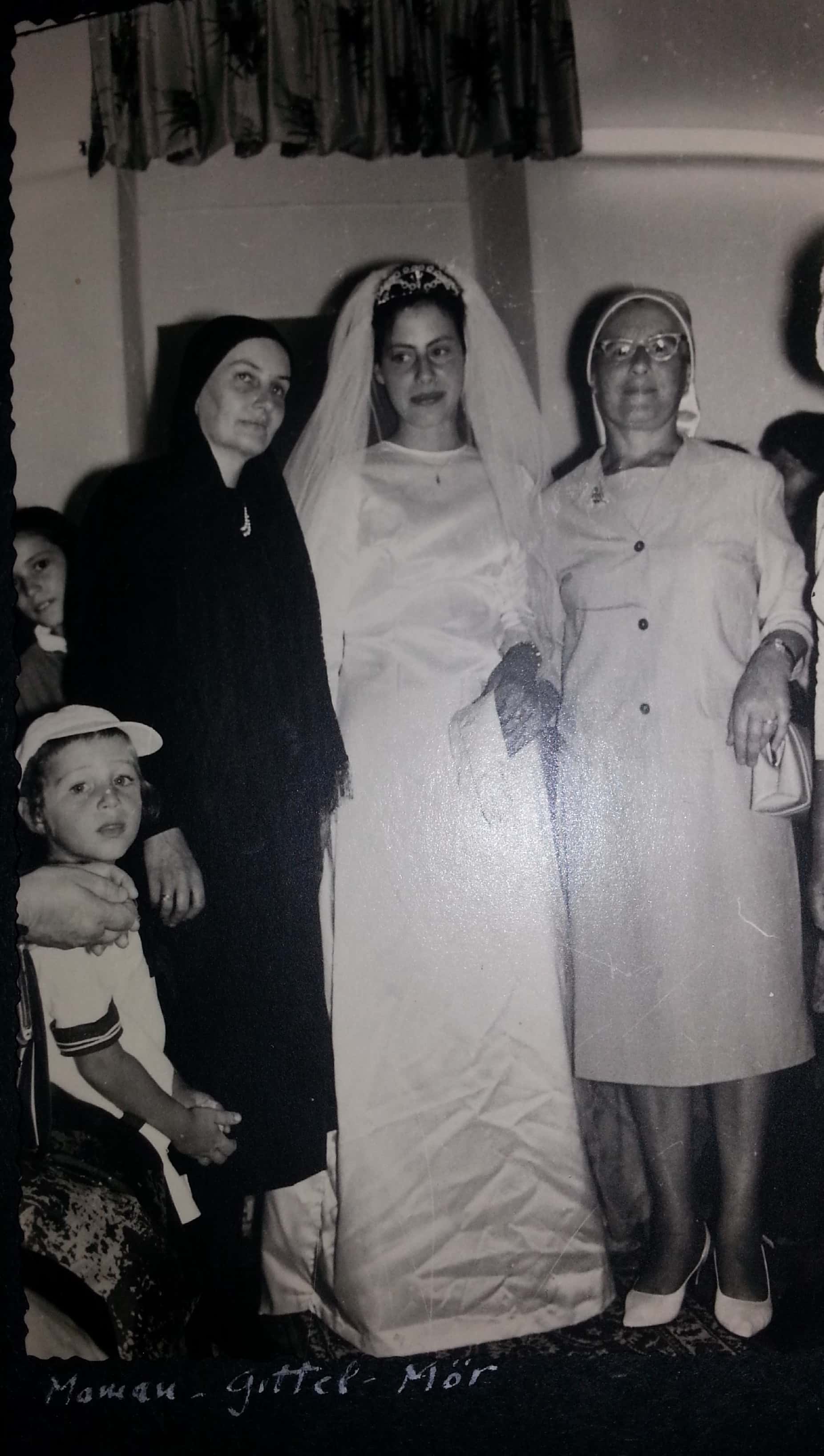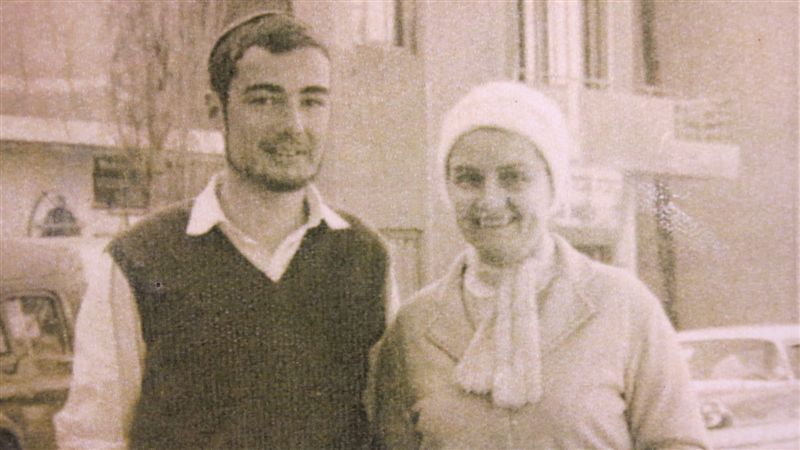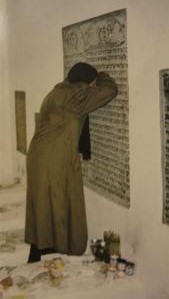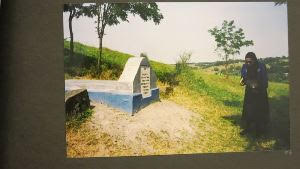The Daughter-in-law of the Convert Who Stirred the Nation: "My Mother-in-law Risked Her Life for the Jewish People"
Ruth Bloy, the convert who passed away 18 years ago, is one of the most famous women in Israel. Known for her immense activism and her marriage to the leader of the Neturei Karta, Rabbi Amram Bloy, her daughter-in-law shares her life story in an engaging conversation.

On the eve of the holiday of Shavuot, the holiday where we remember Ruth the Moabite — the famous convert who joined the people of Israel, we cannot help but mention another convert named Ruth, who also became very famous and profoundly influenced the Jewish world in the Land of Israel. This is Ruth Bloy, who in the last years of her life was married to Rabbi Amram Bloy, the leader of Neturei Karta in Mea Shearim.
 Ruth leading her daughter-in-law Gittel to the wedding canopy
Ruth leading her daughter-in-law Gittel to the wedding canopySearch for Truth
The story of Ruth is told to us by her daughter-in-law, Gittel Davidson, who is married to Ruth's only son, Uriel, who also converted with his mother when he was ten years old.
"My mother-in-law was born in France in 1920," she says. "She grew up in a Catholic family, but she was a non-believer. For years, she searched for the truth. At one point, she even met non-Jews who kept Shabbat and tried to live with them, but very quickly she realized 'this was not it'.
"At the age of eleven, she was baptized into Christianity, and by nineteen she married a man who was in the military; she gave birth to my husband who as a child was called Claude, and two years later she divorced."
Gittel notes that her mother-in-law was very intelligent, beautiful, and talented. "She used the first years after her divorce to study history and geography at the university and completed a master's degree. She worked as a teacher until the Germans took control of parts of France, and the history professor who taught her recruited her into the underground that operated against the Nazis. Her role was to find out who collaborated with the Germans."
 Ruth and her son Uriel
Ruth and her son UrielWhy was she chosen for these tasks?
"My mother-in-law was an exceptionally educated woman, she mastered many languages, and she was also brave and followed her truth till the end. She feared nothing."
As part of her tireless pursuit of truth, Gittel tells us that her mother-in-law and her own mother hid Jews in their home during the war, and her mother-in-law even risked her life to bring Jews from all over the city to the house. "She used forged documents and special permits and sneaked around at night. She managed to save many Jews and hid them.
"I have a daughter who lives in the United States today; a few years ago she attended a Torah class, and there she had the opportunity to mention that she is the granddaughter of the convert Ruth. There was someone who heard this and approached her, very excited, saying — 'My grandfather was pursued by the Nazis, and your grandmother was the one who saved him and brought him to the train'. He also added: 'Grandpa always told us that if we ever meet her, we should thank her for it. And here is the opportunity".
 Ruth praying at graves in Ukraine
Ruth praying at graves in UkraineTo the Jewish People
For a certain period, Ruth worked as a merchant, with her partner being a Jewish Holocaust survivor. "This led her to become interested in Judaism and decide she wanted to convert, but the conversion she first underwent was Reform conversion, not according to halacha. Only after she arrived in Israel for the first time and began attending Torah classes did she discover that the conversion was not valid, and she then underwent an authentic conversion.
"With my mother-in-law, it was all the way — once she converted properly and understood she had to cover her head, despite being divorced, she immediately covered it with a full covering. You can also see in the pictures that there were no intermediate stages."
After she converted and became Ruth Ben David, and her son underwent a brit milah, Ruth engaged in commerce for years, while initially sending her son to study in a yeshiva in France, later he was sent to the Be'er Yaakov Yeshiva in Israel.
"My mother-in-law did a lot over the years," Gittel says admiringly. "She was sent for various missions for a certain period. Among other things, she reached Arafat on the eve of the Lebanon War and discussed with him the missing soldiers: Zachary Baumel, Zvi Feldman, and Yehuda Katz.
There was also a time when she searched worldwide for the child Moshe Simon from Petah Tikva, who was probably kidnapped by Christian missionaries. At some point, she thought she found him in a Christian institution and presented herself as a relative. She then took him for a medical examination, where it was discovered that the child was not circumcised... meaning — there was no chance he was Moshe Simon, but out of pity for the lonely child, she paid for his dental treatments and ensured he was rehabilitated.
"At some point, she was also sent to Iran to try to save from death a Jewish merchant who was convicted of spying for Israel, and she also flew to Syria, Jordan, Lebanon, and other various places. We didn't always know about her actions because a large part was done without publicity."
Into Mea Shearim
Since Ruth immigrated to Israel, she received many matchmaking proposals, but she rejected all of them until the surprising match with Rabbi Amram Bloy, the leader of the Neturei Karta, came along.
It could be presumed that the idea of the match sounded absurd at first, as Rabbi Bloy was a father of ten children, widowed from his wife, and considered a righteous and revered leader. "It appeared unimaginable that he would marry a convert, especially one twenty years younger than him. But he expressed his desire, and my mother-in-law wanted very much and was willing to do anything for him. She considered him a perfect saint, and when he told her she would have to cover her head like the women of Mea Shearim and change her style of dress, she fully complied with that.
"In later years, when asked why he agreed to marry a convert, he said that he heard she was an extraordinary woman of kindness, which indeed was true. Throughout her life, she always supported the poor, widows, and orphans. Many unfortunate people knew her home as their home, even if they were strange or physically or mentally ill. For years, she also ran a nursing home with lonely people near Mea Shearim."
Incidentally, Gittel testifies that until her mother-in-law's last day, she lived modestly, "She had one dress for Shabbat, no more. She found no value in external appearances, instead investing in her inner self."
 Praying at graves of the righteous
Praying at graves of the righteousA Woman of Truth
A year after Ruth married the leader of the Haredi community, her son Uriel also married Gittel. "Ever since I joined the family, I have continuously admired my mother-in-law," she says.
What do you remember about her last years?
"I remember a very warm woman, a loving mother, and a family-oriented grandmother. Every time she traveled abroad, she brought clothes and gifts for the grandchildren. Overall, we had a very loving and constant connection, as my husband would go to her every day, driving her to many places. I remember, for example, during the period she was searching for the child Moshe Simon, she asked my husband to take her to Nablus. They entered, and the city was very hostile, so she asked him to play Arabic music loudly, which they did. Nevertheless, the Arabs surrounding their vehicle realized they were Jews... It was terrifying, but she was very brave, always standing by her principles. By the way, during all those travels, she also managed to reach the Western Wall before the Six-Day War, entering through Syria and Lebanon."
Gittel shares, "My mother-in-law loved me very much, and I loved her too. In the early 90s, she needed to travel to Ukraine for some reason, and though the trip back then was very complex and required a visa, she was not deterred, and she invited me to join the journey. It was an immense excitement; we were truly a chosen few who managed to visit the graves of the righteous in Ukraine. A week before the flight, I visited all the graves of the righteous in Israel to pray that I would be able to focus in my prayers in Ukraine. I was a kindergarten teacher then and took with me a list of all the students and their families' names for prayer...
What is the main thing you learned from your mother-in-law?
"I learned from her consistency, immense love for everyone, and the ability to handle every situation, as well as her steadfast dedication to her mission. To think that for several years she searched for a child who disappeared. It's amazing".
And Gittel wants to note another thing: "Both my mother-in-law and her husband were anti-Zionists, and therefore, they took nothing from the state. I greatly admire this because it wasn't as if they opposed on one hand and enjoyed the benefits on the other, but they strictly avoided using anything from the state — not electricity, not public transportation, not national insurance, not health funds, and my mother-in-law never flew with El Al either. They were people of truth who clung to their principles, and I think this is something truly worthy of admiration".

